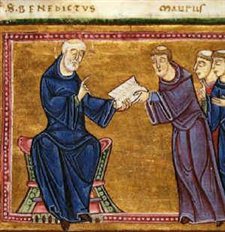Tuesday, March 21, 2017
Benedictine Divinity versus Theology and Philosophy
Holy Father Benedict, pray to God for us!
On this, the Feast of the passing of St Benedict, I find that a topic that I touched on in my previous post is quite pertinent, and one that needs thinking about very seriously.
Having looked at the Liberal Agenda below, it seems clear that many people who claim religious roles in society are exercising their brains in Philosophy rather than true Theology. Indeed, Theology in modern UK universities tends to be more about Comparative Religion, and the Philosophy of Religion rather than what the Doctors of the Church would regard as true Theology.
St Benedict himself is not classed as a Doctor of the Church. He is an Abbot and Confessor in Liturgical parlance. He is no bishop, king, or prelate, and yet he establishes a Rule that puts people on course for the Divine. It is a rule that will give rise to hospitals, schools, and universities, and is thus at the heart of our lives, and yet people are tending to follow the course of the Liberal Agenda rather than put their trust in a system of work and prayer. His is a path that uses a Theology that's lived in rather than studied and put into practice through argumentation. For me, whether this is accurate or not, this represents the difference between Theology and Divinity.
Divinity seems to be dying out in the universities in the U.K. It was an academic discipline that combined theology with ministry: in short, it might be described as applied Theology.
This makes sense. We encounter God Himself when we engage in His service. First, we pray, and then we work. The whole point is that Theology is never separated from a way of living life. We are to spend our days in the Light of Tabor shining from the Divine Godhead and seeing our lives ahead by that great light. We learn to trust in our superior, and our superior is bowed under the weight of his office which can only be held up by our trust and community spirit. Divinity, then, is a superior discipline to Theology, and it is one that all Christians should study regardless of their academic capabilities.
Sadly, the ACC is too tiny for a seminary in this country. Yet a seminary education is of greater value than divorcing ourselves from reality within a modern Theological College especially at a time when students think that it's okay to "experiment" with liturgy to the extent that it is willing to try out blasphemies rather than submit to the rule of the Liturgy. A seminary education that involves study intrinsically interwoven with prayer and work will therefore prove invaluable as it restores the sense of the sacred.
It is the sense of sanctity that we need to recover in our Society. The Liberal Agenda can only hold that nothing is sacred which is contrary to any understanding of the Holy Incarnation of Our Lord. The result of the Liberal Agenda is an incipient Arianism or, even worse, Ebionitism which focuses only on the humanity of Jesus and forgets about the Divine nature that comes inseparably with His Human Nature. Holiness, Love, and Worship are not feelings; they are activities wrapped up in realities in this strange synthesis between being and doing.
That there exist Christian Dogmata that cannot be genuinely questioned by Christians without calling one's own faith into question defies the Liberal Agenda. To question whether there is a god is fine in philosophical circles, or even in a study of comparative religion, but to call the existence of God into question before His face shows that there is a doubt within that Christian that needs to be addressed. For a Christian to call God's existence, or His commands, or His doctrine into question demonstrates a spiritual dis-ease that requires healing through prayer, work and study within a loving community. It is not to be accepted as a legitimate alternative to "the way we do things." It is certainly not "progress" unless by progress we mean proximity to Hell itself.
As I say, we in the ACC have no seminary. The best we can do is read for our orders under the guidance of the Bishop and then look to see how we can live our faith in a little community of people who do actually believe what they read in the Liturgy. It is not ideal, but we talk with each other and listen to each other. If the time comes when we finally have the resources for a seminary, I shall be most pleased to support it as best I can with what personal capacities I can. However, our size does not prevent us from striving to study Divinity rather than some useless academic discipline which seeks to tear the Church apart.
Until then, I continue to pray: Suscipe me, Domine, secundum eloquium tuum, et vivam,. et non confundas me ab expectatione mea.
Subscribe to:
Post Comments (Atom)



No comments:
Post a Comment